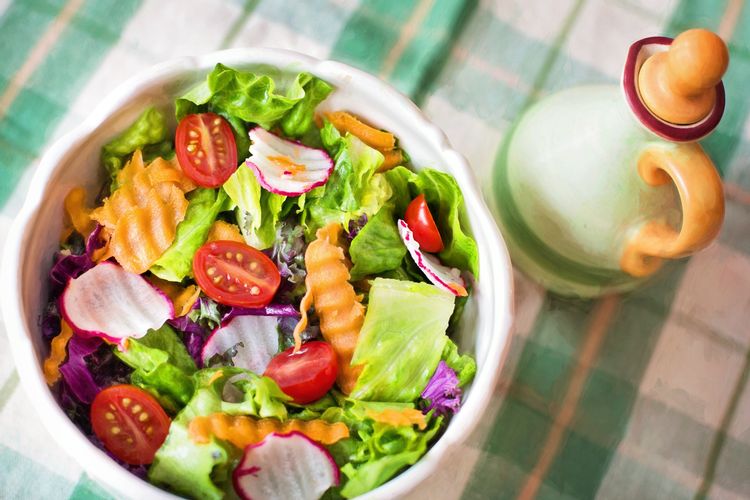Leaky gut is often a result of an unhealthy balance of bacteria and yeast (candida) in the lining of the gut. If you're looking for recommendations to help heal leaky gut syndrome through your diet, we're going to share some of the best foods to eat and foods to avoid with leaky gut syndrome, so you can treat leaky gut with your diet.
Table of Contents
| General Diet Recommendations | Foods to Eat |
| Types of Diets | Books |
| Foods that Cause Leaky Gut | Recipes |
| Foods to Avoid | Infographic |
Why diet is important for healing leaky gut
According to the U.S. Department of Health & Human Services, "when the small intestine becomes inflamed...it is less able to absorb nutrients from food". Inflammation may lead to some of the common symptoms associated with leaky gut , including constipation, diarrhea, gas, and bloating.
Improper digestion may lead to a lack of vitamins and nutrients, which in turn may compromise the immune system. Here are some general recommendations on how you may change your diet and we'll discuss some more specific ones below.
-
Take a whole foods multivitamin
-
Consider taking other nutritional supplements, including a probiotic (talk to your doctor or naturopathic physician)
-
Avoiding greasy or fried foods, spicy foods, creamy sauces, meat products, and foods high in fiber, like nuts and raw fruits and vegetables
-
Eat small meals more frequently
Types of Diets
Vegetarian diet
A vegetarian diet excludes meat. An alternative version of this is the pescatarian diet, which is essentially a vegetarian diet which includes fish and other seafood. While a vegetarian diet is beneficial for leaky gut, a pescatarian diet may be even better because of the essential oils, particularly omegas, found in fish. Too much dairy in a vegetarian diet may also have a negative effect on leaky gut.
Vegan diet
Like a vegetarian diet, a vegan diet excludes meat, as well as dairy products like milk, cheese, and ice cream. A vegan diet is particularly beneficial for leaky gut syndrome because it is thought that meat and dairy products exacerbate the symptoms of leaky gut.
Paleo diet
In a paleo diet, you eat foods consisting chiefly of meat, fish, vegetables, and fruit. This diet is suppose to follow what our early ancestors would have eaten and excludes dairy and grains, as well as processed foods, all of which could be helpful to healing leaky gut. Choose organic meats and avoid fruit high in sugar if you suspect candida.
Anti-inflammatory diet
According to research, "the most important aspect of an anti-inflammatory diet is the stabilization of insulin and reduced intake of omega-6 fatty acids". This diet promotes foods that reduce inflammation and avoid foods that cause inflammation. According to the Arthritis foundation, foods to eat include: fish, blueberries, blackberries, cherries, strawberries, spinach, kale, broccoli, walnuts, pine nuts, pistachios, almonds, pinto beans, black beans, red kidney beans, garbanzo beans, olive oil, and red onion. You'll also avoid foods like nightshades, salt, alcohol and processed foods.
GAPS diet
The Gut and Psychology Syndrome Diet (GAPS diet), focuses on eating nutrient-dense food that is beneficial for the intestinal lining, while removing any foods that are difficult to digest or potentially damaging to intestinal health. This diet is often used for people suffering from IBS, IBD, leaky gut, autism, ADHD, depression, anxiety, or other autoimmune diseases.
The GAPS diet will include the use of a probiotic, essential fatty acid supplements, Vitamin A supplement, and the use of digestive enzymes to assist the body in the breakdown and absorption of food and nutrients.
Candida diet
To cure candida, many health practitioners recommend a candida cleanse diet. During the cleanse, you would eliminate sugar, white flour, yeast, and dairy. This is in an effort to eliminate any yeast growing in your intestines. Curing yourself of candida is likely to be beneficial for the health of your gut, and you may modify the candida diet to treat leaky gut syndrome by simply adding some additional foods which may help heal leaky gut (found below).
Intermittent fasting
MIT's recent study finds that fasting is able to regenerate intestinal cells. That's good news for people suffering from leaky gut syndrome. Fasting is an opportunity to rest your body from its normal functions and provide it with time to heal. Intermittent fasting is one of the safest ways to fast according to healer and fasting expert Tommy Lockward. "Fasting offers many health benefits, as it boosts the body's immune functions and stem cell regenerative response. For people with leaky gut syndrome, fasting, when done correctly, combined with an alkaline diet could prove to be very beneficial in detoxifying the entire system, restoring balance to the flora in your gut, and starving out any candida that may be present".
Foods for leaky gut syndrome
Looking for some of the best foods to eat for leaky gut syndrome? Here's a list of superfoods that may help heal leaky gut syndrome.
-
Apple Cider Vinegar
-
Bone Broth
-
Coconut Oil and Coconut Butter
-
Fermented Vegetables
-
Ginger
-
Peppermint
-
Pumpkin Seeds
-
Slippery Elm Tea
-
Yogurt
Want to know more? Read about these 10 foods that heal leaky gut syndrome.
Sample Grocery List
When you go shopping, stay away from processed foods. Avoid anything in a package, including donuts, bread, bagels, soda, cereal, chips, and frozen foods. Here's a sample grocery shopping list:
- 1 lb. organic beef
- 4 avocados
- 1 lb. spinach
- Coconut oil
- 1 cabbage
- 1 celery
- 1 cauliflower
- fresh ginger

Foods to avoid with leaky gut syndrome
There are many foods to avoid with leaky gut syndrome, as they will cause irritation and make your symptoms worse. What foods bother leaky gut syndrome? Here's a list of foods to avoid with leaky gut syndrome:
-
Raw vegetables
-
Nightshade vegetables
-
Fruits high in sugar (banana, mangoes, oranges, cherries, kiwi, grapes, pears, peaches)
-
Gluten
-
Nuts
-
Artificial sweeteners
-
Processed foods
-
Refined vegetable oils
Foods that may cause leaky gut syndrome
There are many theories on what causes leaky gut syndrome. Here's a list of foods most experts agree may cause leaky gut syndrome:
-
Non-organic meats
-
Wheat
-
Dairy
-
Refined sugar
-
Wine and alcohol.
-
Soda that contains phosphoric acid
-
Coffee
-
Foods grown with pesticides.
Want to learn more? Read about these Foods That Cause Leaky Gut.
Antibiotics
Antibiotics certainly play an important role in Western medicine and the curing of various conditions. However, many naturopathic physicians and natural health practitioners consider unnecessary antibiotics to be a cause of imbalance in the body, which in turn promotes unhealthy flora in the intestine and weakens our immune system.
In addition, antibiotics in your food may also cause an issue. Therefore, it is generally recommended to eat organic meat and dairy products if you choose to include those in your diet for leaky gut syndrome.
Leaky gut syndrome diet recipes
Leaky gut syndrome recipes focus on how to make some of the fundamentals you'll need to heal leaky gut. This includes making meat stock, chicken stock, and bone broth. You'll also want to learn how to make your own home-churned butter and ghee. Fermented vegetables and grain-free bread are also basic staples you'll need to learn how to prepare.
While the details of all these things are too much to go into here, we've included eight links to some recipes to get you started:
You may also be interested in how to ferment vegetables. Next we'll share some book recommendations to help further guide you.
Leaky gut syndrome diet books
Here are some good books on Leaky Gut Diet and Leaky Gut cookbooks with recipes:
The Complete Leaky Gut Health and Diet Guide: Improve Everything from Autoimmune Conditions to Eczema by Healing Your Gut
by Dr. Makoto Trotter and Doug Cook.
Eat Dirt: Why Leaky Gut May Be the Root Cause of Your Health Problems and 5 Surprising Steps to Cure It
by Dr. Josh Axe.
Healthy Gut Cookbook: 150 Stage-By-Stage Healing Recipes to improve your digestive health
by Gavin Pritchard and Maya Gangadharan.
Leaky Gut Diet: The FODMAP Diet Made Easy - Simple solutions for IBS and Bowel Disorders
by Ellis Power.
References
Arrieta, M. C., Bistritz, L., & Meddings, J. B. (2006). Alterations in intestinal permeability. Gut, 55(10), 1512-1520. http://doi.org/10.1136/gut.2005.085373 . Retrived on June 11, 2018, from https://www.ncbi.nlm.nih.gov/pmc/articles/PMC1856434/.
Arthritis Foundation. (n.d.). Anti-Inflammatory Diet. Retrieved June 11, 2018, from https://www.arthritis.org/living-with-arthritis/arthritis-diet/anti-inflammatory/anti-inflammatory-diet.php.
CommonHealth of Virginia. (n.d.). 7 Best Foods for a Healthy Immune System. Retrieved June 11, 2018, from http://www.commonhealth.virginia.gov/.
Harvard Health Publishing. (n.d.). Foods that fight inflammation - Harvard Health. Retrieved June 11, 2018, from https://www.health.harvard.edu/staying-healthy/foods-that-fight-inflammation.
Minihane, A. M., Vinoy, S., Russell, W. R., Baka, A., Roche, H. M., Tuohy, K. M., ... Calder, P. C. (2015). Low-grade inflammation, diet composition and health: current research evidence and its translation. The British Journal of Nutrition, 114(7), 999-1012. http://doi.org/10.1017/S0007114515002093 . Retrieve June 11, 2018, from https://www.ncbi.nlm.nih.gov/pmc/articles/PMC4579563/.
Sears, B. (2015). Anti-inflammatory Diets. J Am Coll Nutr.,34, 14-21. Retrieved June 11, 2018, from https://www.ncbi.nlm.nih.gov/pubmed/26400429.
U.S. Department of Health & Human Services. (2018, March 14). Inflammatory bowel disease. Retrieved July 11, 2018, from https://www.womenshealth.gov/a-z-topics/inflammatory-bowel-disease










